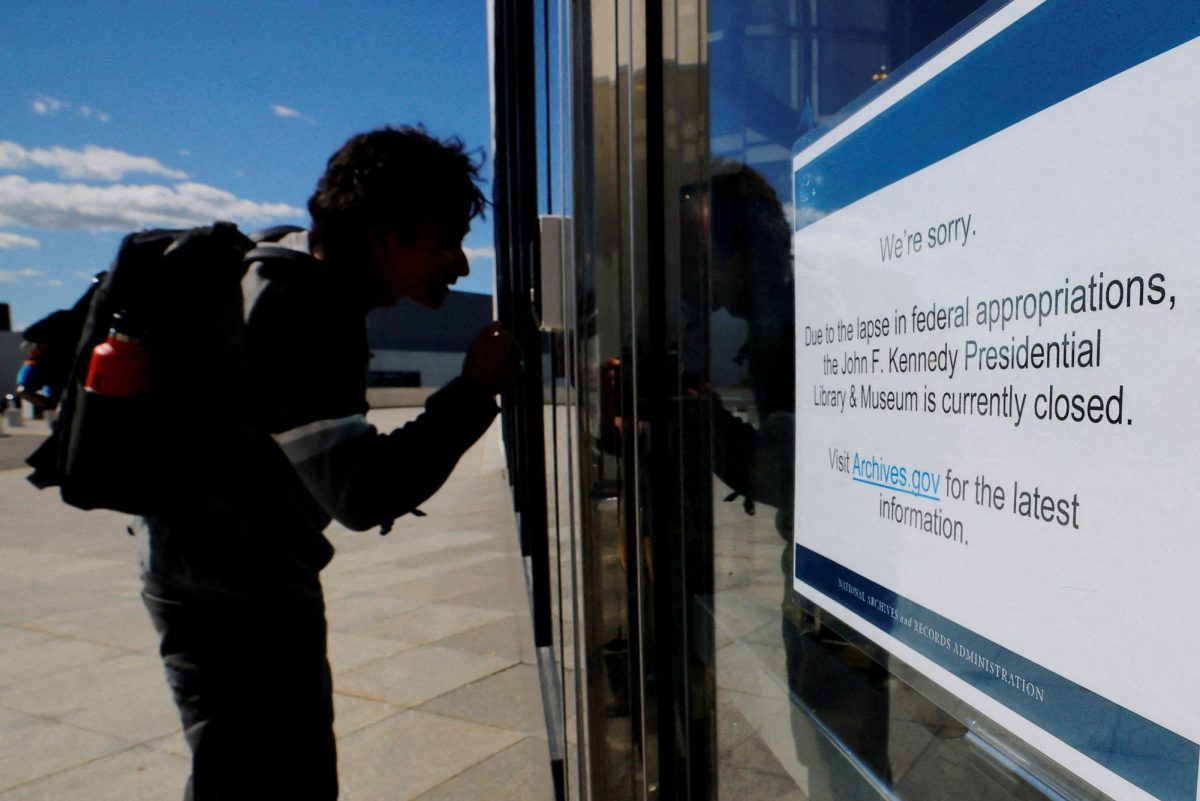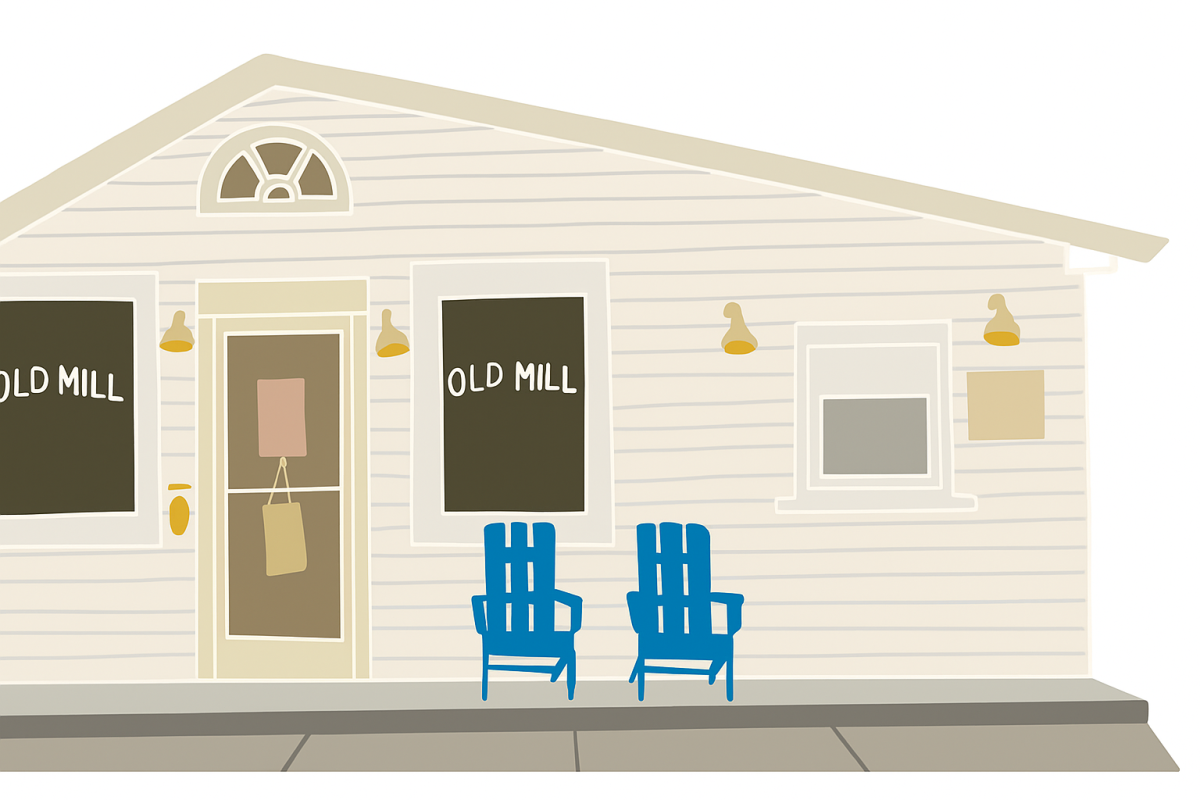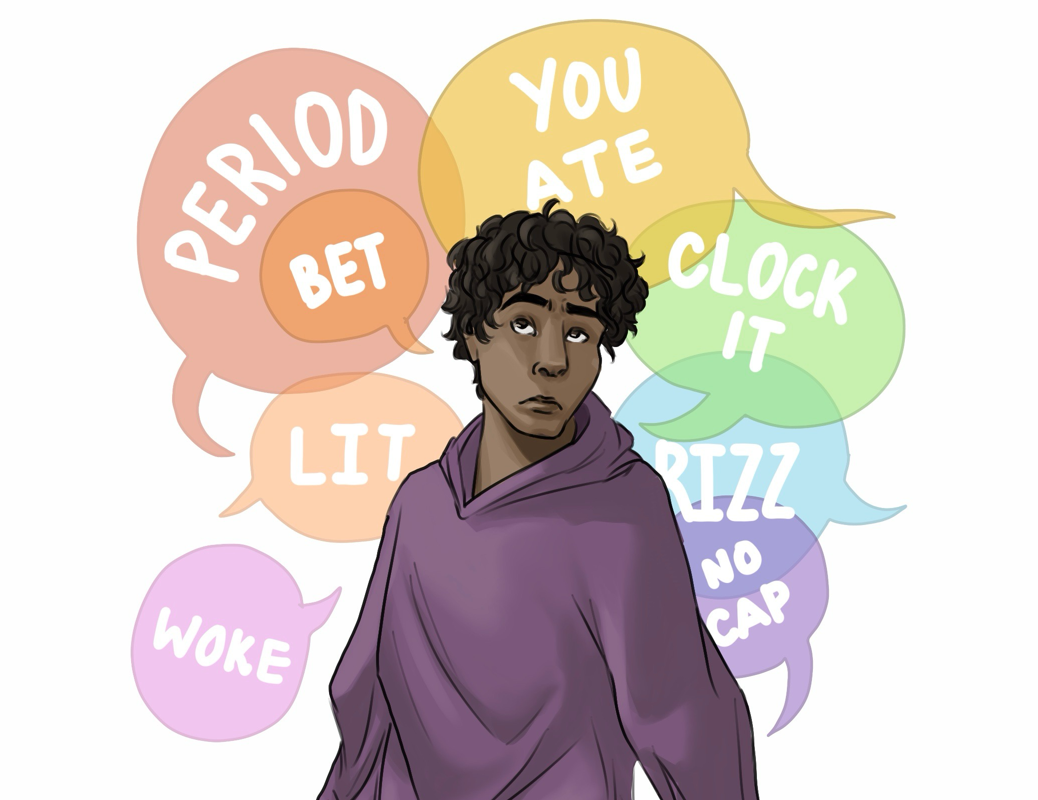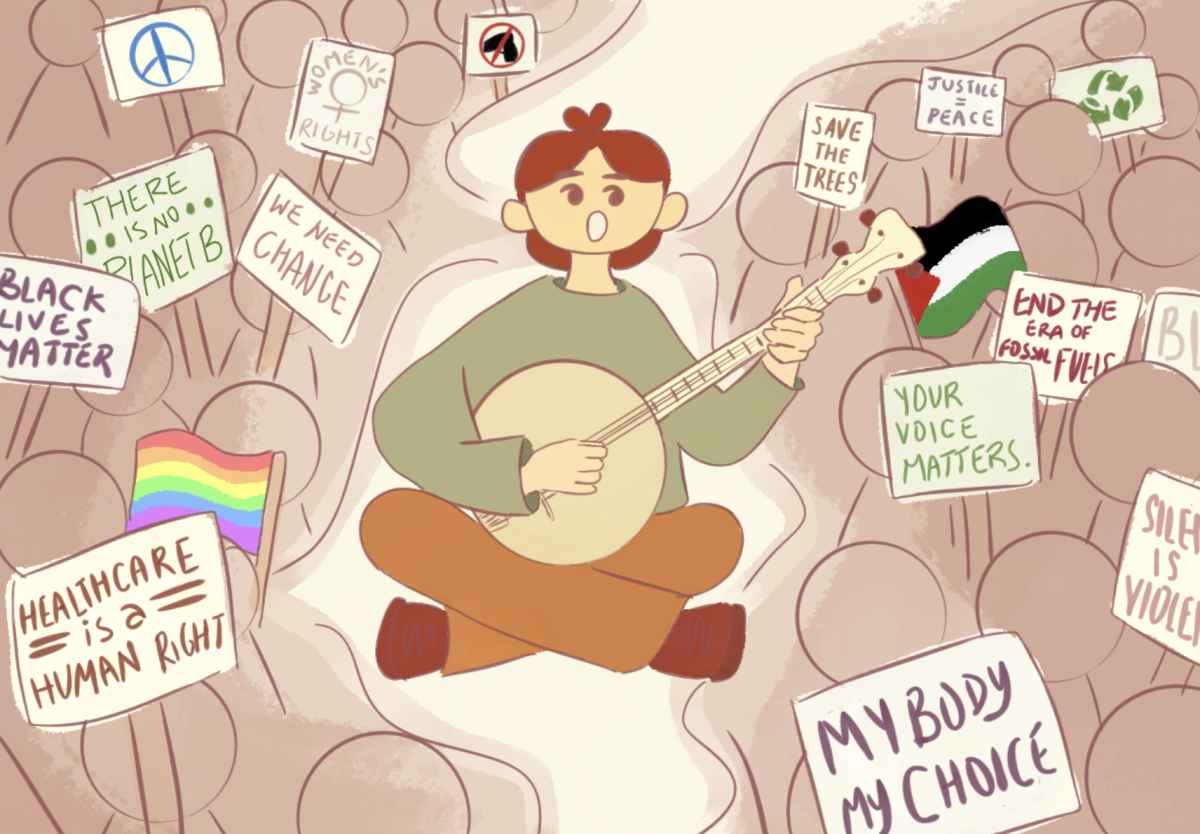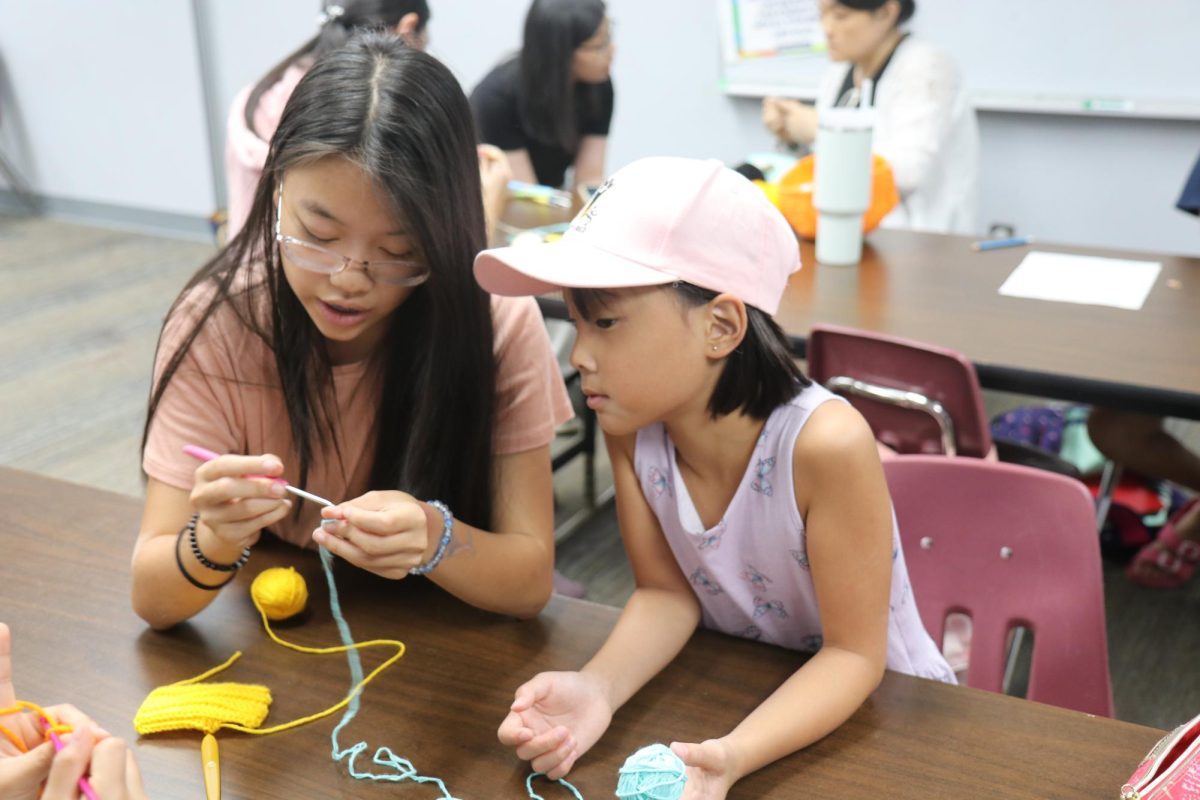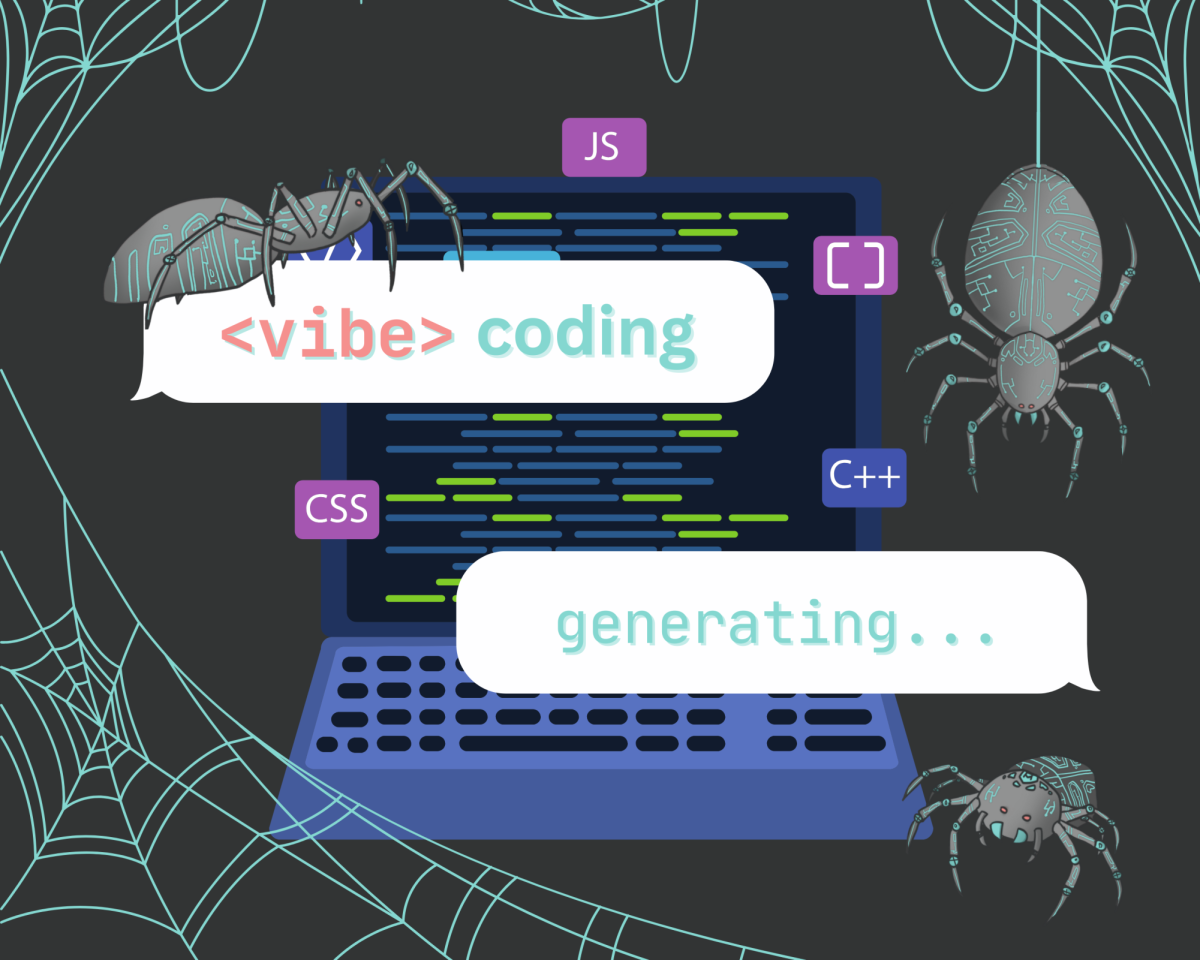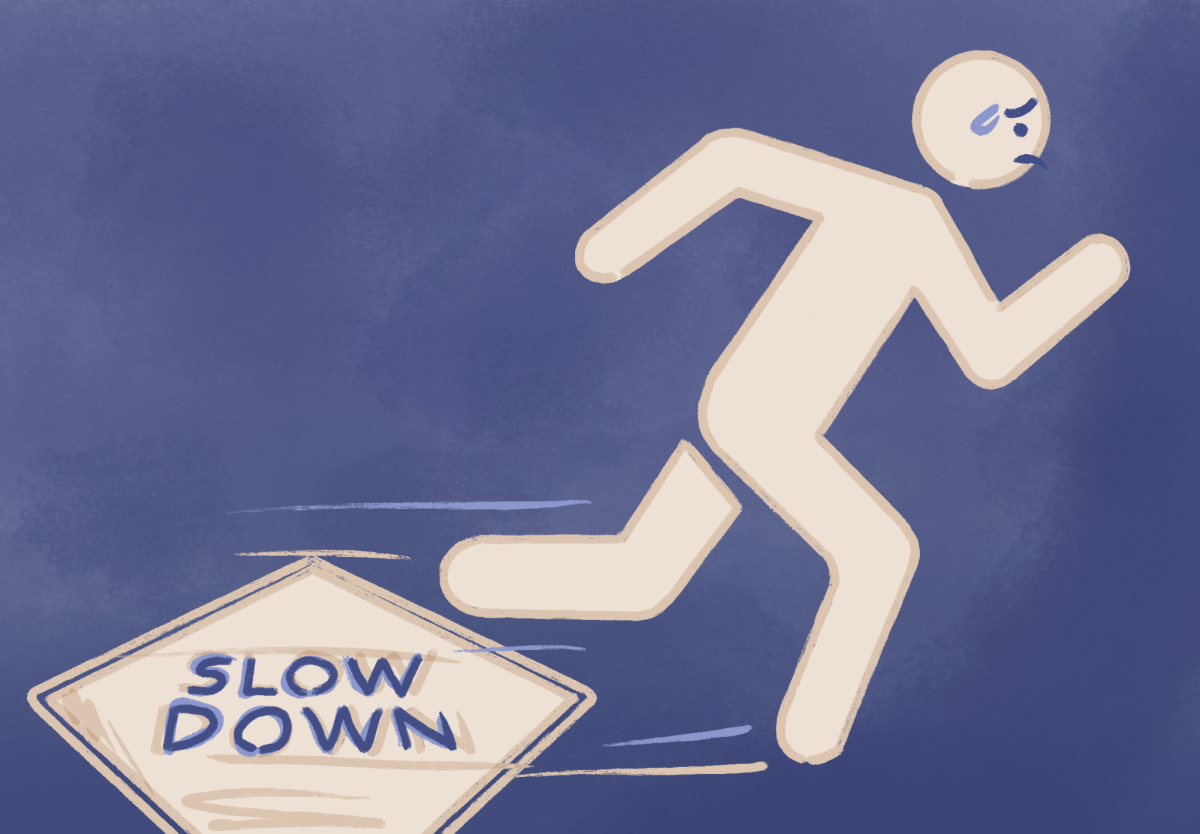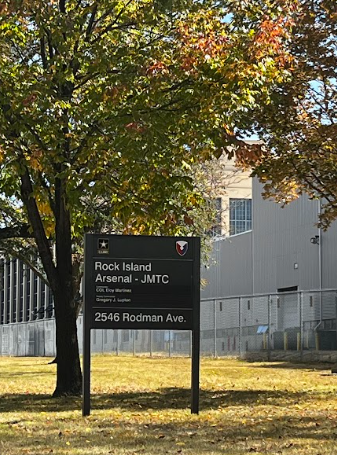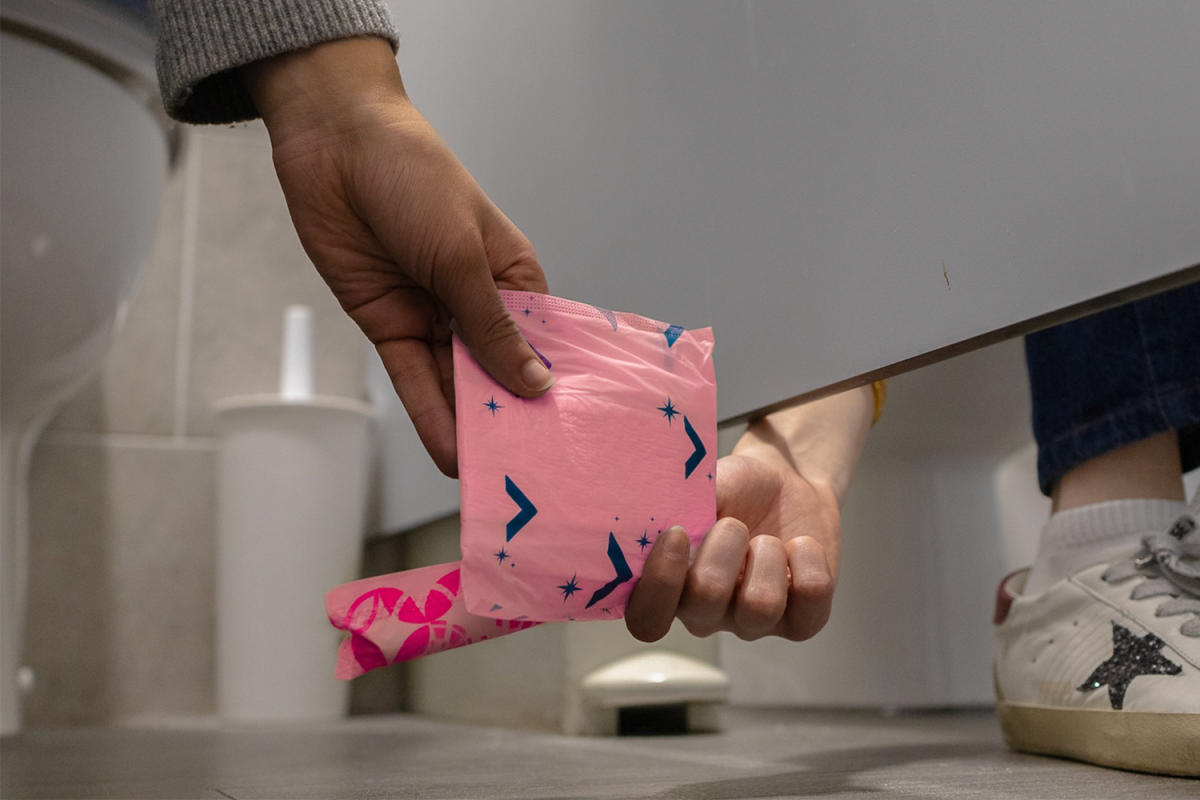Editor’s note: *Feminine terms such as women and girls are used by sources throughout this piece to refer to people who menstruate.
As Social Studies Teacher Becky Mason watched her AP U.S. History students trickle out at the end of class, she noticed one student remained glued to her seat.
“She was just sitting there,” Mason said. “And then, like, she got up and like, she really had blood.”
After helping the student collect herself, Mason said she understood the “abject fear” the student was in.
“There would have been boys around and she didn’t want to stand up,” Mason said. “I get it.”
As the student thanked her for her help, Mason said she wondered if a different teacher would have been as understanding.
“What if this had happened in a class with a male teacher?” Mason said. “Would she have felt comfortable? I hope so.”
School stigma
K-12 Health Department Head Tolani Enin said the discussion around menstruation is introduced in Grade 5 health classes that are divided between genders.
“In terms of the age appropriateness of teaching about, you know, menstruation and body changes in fifth and sixth grade, we feel as a team that it’s really more appropriate to split the group because girls at that age, they’re still so little, they’re 9 and 10 years old, right?” Enin said. “They feel a little bit embarrassed to talk about periods, and we want to ensure that they have a certain comfort level when we talk about their body changing.”
Ariana Van Hese (’27) said there are rarely any discussions around the effect of menstruation on mental health outside of the classroom.
“The only time we have proper conversations about menstruation is in health, and we never really talk about that mental part and how it can actually, like, take a toll on a girl, especially when they’re going through high school, or as a teenager, like, we’re all studying, we’re trying to do well in school,” Van Hese said. “It can definitely be like a barrier to a lot of activities or prevent us from doing certain things, which is like a real shame.”
Van Hese said menstruation was a particularly taboo subject when she was younger.
“In middle school, it was, like, something no one would talk about because it was embarrassing, or the guys were always like, ‘Ew,’ when you’d bring it up,” Van Hese said.
While Ranger Wells (’28) doesn’t menstruate, he said he notices his female friends are often self-conscious about the topic.
“I’ve seen and heard some of my friends talking about how, like, it’s a very uncomfortable topic, and they feel like it’s too much information,” Wells said. “One time, I remember one of my friends saying, ‘I’m not feeling very well. I’m on my period.’ And then she immediately went, ‘Oh, sorry, TMI.’ You don’t have to be embarrassed about that because it’s not your fault.”
High School Counselor Yanna Jackson said people who menstruate tend to “hide tampons or hide pads” in embarrassment.
Similarly, Hannah Lindner (‘25) said small actions can often reveal a lack of education on menstrual health.
“As a school, we aren’t talking about periods, or we’re not talking about menstrual health in general,” Lindner said.
Lindner said shame about menstruation is stimulated by behavioral teachings from friends or siblings, such as “learning how to discreetly open a pad in the bathroom.”
Nurse Adam Bonnington said menstrual products are always available in the nurse’s office, and people can “come in and point to the bathroom” without any explanation.
Moreover, Lindner said using alternatives to the word period, such as shark week, often paints a negative picture of menstruation and reproductive health.
“Shark week, in particular, makes it seem like such a negative bloody massacre, which it can be, but I also think we should think of it in a more empowering way,” Lindner said.
Similarly, Van Hese said alternative names contribute to the secrecy surrounding menstruation.
“If we’re having to come up with code words and use them in class, or like to tell a friend, like, ‘Do you have any supplies? I’m on my shark week,’ that’s just adding more to keeping it a secret,” Van Hese said.
Mason said there is an unspoken understanding between her and her students when it comes to menstruation.
“I’ve had girls where, like, sometimes I’d be like, ‘Do you really have to go?’” Mason said. “And you get the, ‘I need to go,’ and you’re like, ‘You go, girl.’”
In addition, PE Teacher Alice Harwood said a difference in gender makes discussing menstruation more challenging for students.
“It’s hard enough for them to tell a female PE teacher that they’re on that period, or even their peers, let alone a male,” Harwood said.
High School Learning Specialist Geoff Richman said he admits it’s “a little bit awkward” to have conversations about menstruation simply because he doesn’t have those conversations regularly.
Lindner said she grew up in a household that was “open to talking about our bodies and menstrual health,” and she was surprised when people would tell her to avoid the topic at school.
Menstrual education
Enin said Grade 5 and 6 health classes walk girls through basic menstrual information, including “how you look after yourself” and “who to go to” when it happens for the first time.
Wells said the discussions around periods that include those who don’t menstruate are brief.
“It’s a little glossed over, but I think they cover it enough that a school should,” Wells said.
In the nurse’s office, Bonnington said it’s a priority to normalize menstrual health while still maintaining sensitivity for students who aren’t comfortable about the conversation yet.
“We, as a nursing team, have always wanted, really, to kind of try and make it as kind of normal as possible, and for us to be kind of as supportive and open as we need, but equally acknowledging that some people are going to be kind of self-conscious about it and sensitive about it,” Bonnington said.
As a male nurse, Bonnington said he acknowledges that students may feel more hesitant to discuss menstruation with him.
“Ideally, we wouldn’t want anyone to feel kind of self-conscious or embarrassed or in any way kind of restricted about talking to a male member of staff about their period,” Bonnington said. “But the reality is that people, lots of people, have different kinds of comfort levels.”
Additionally, Harwood said discussing menstruation is difficult for students who are not female.
“We have had incidents where there’ve been students who have started their period who identify as a male but didn’t want to acknowledge to their coach that they were in that period,” Harwood said. “It was kind of a difficult situation for them.”
To normalize menstruation, Harwood said she makes an effort to use the word period.
“I write in my emails to the whole class, ‘If you’re on your period, email me,’” Harwood said. “I know boys and girls are going to get that, but I want them to see that language.”
Even then, Harwood said some of her students still prefer to explain they are on their menstrual cycle inexplicitly.
“Sometimes I’ll get an email from their mom that they don’t want to tell you, and they’ll kind of be shy about it, and they also get scared of their peers,” Harwood said. “Peers are going to ask them, ‘Why are they not swimming?’”
Additionally, Wells said everyone, regardless of gender, should be comfortable discussing menstruation.
“Both male and female students should be learning about this because it’s just a part of being a human,” Wells said. “It’s not a sensitive topic.”
As a teacher, Mason hopes faculty recognize how menstruation can affect a student’s performance. She said even though she and other women may struggle with menstrual pain, they are present at school and “want to be in the building.”
Lindner said she wishes students could be more open about menstruation in classroom settings.
“I wish it was easier to just, like, raise your hand and be like, ‘I need to go to the bathroom,’” Lindner said. “And if a teacher says, ‘No,’ you can be like, ‘I’m on my period,’ but we can’t say that.”
Mental health and misconceptions
Harwood said the stigma around menstruation often comes in the form of condescending comments, particularly to do with a woman’s attitude.
“It’s the classic, like, ‘Oh, she’s so moody. She’s going to start a period soon,’” Harwood said. “That’s one of these things that people love to say.”
Similarly, Jackson said these comments extend to the political sphere, where they are used as a way to undermine a woman’s ability to do good work.
“There’s always like jokes about, like, women leaders, because when they get their periods, they’re moody and, like, will make bad decisions, which is just ridiculous,” Jackson said.
Jackson said these stereotypes even influence “how we actually think about girls and women” as a whole.
Moreover, Bonnington said these comments are often unprompted and are “definitely stigmatizing, if not bordering on bullying.”
Often, Jackson said, menstruation is used as an excuse to invalidate women’s emotions.
“Obviously, we can, like, brush it off our shoulder, but it’s also like you probably really do think that I’m like a whole different person, or, like, I’m crying because I’m on my period, but maybe I’m just crying,” Jackson said.
Van Hese said it’s especially frustrating to hear jokes about menstruation from people who don’t experience it themselves.
“I’ve definitely, like, had rough days when I’m on my period, and then a guy said to me, ‘Oh, someone’s on their period,’” Van Hese said. “Even when I’m not on my period, if I’m being moody, someone will, like, make a comment, and it’s kind of like, ‘Who are you to say that? Especially when you don’t go through what I go through.’”
As a witness to these comments, Bonnington said they are unacceptable to make.
“I would call it old school behavior and is something that isn’t acceptable in modern society, and we should be calling that kind of behavior out,” Bonnington said.
Moreover, Bonnington said while the menstrual cycle has been “used by men as a way of explaining women’s moods and frustration levels,” it’s important to acknowledge that hormonal changes are inevitable.
Lindner said a hormonal imbalance when menstruating shouldn’t be seen as shameful.
“When you’re on your period, obviously, like, your hormones are going crazy, but that shouldn’t be an invalidating thing,” Lindner said.
Bonnington said people who don’t menstruate are often oblivious to the fact that it might have an effect on them, too.
“As boys, we should be aware of this because if and when we get into relationships with girls, it’s going to be a part of our lives as well,” Bonnington said.
Furthermore, Richman said it’s essential that people who don’t menstruate discuss factual information regarding menstrual health.
“Women go through it every month, so why wouldn’t we talk about what 50% of the population is going through and the experience that they’re having?” Richman said. “Especially as it regards mental health, I guess, social and emotional well-being within any given month, as well as physical health.”
Period symptoms
Mason said growing up watching her sister struggle with severe period pain opened her eyes to the extreme nature of some menstrual symptoms.
“Every month, she had a couple days off because she couldn’t move, and she would throw up from the pain,” Mason said.
Mason said she strives to take into account the possibility of extreme menstrual pain as she navigates classroom environments.
“You have people in your class that have so much pain that they’re barely functioning,” Mason said. “I don’t think we necessarily remember that. Even as a woman. But I wish I could do more because that pain is real.”
Similarly, Jackson said period pain can severely impact educational experiences for students who menstruate.
“It’s hard to be present in class when you have like, really bad cramps, and like, just being more understanding and making, like, things in education more accessible,” Jackson said.
Having experienced symptoms such as fevers and extreme nausea, Van Hese said those with severe symptoms have “a completely different life” from those who do not experience them.
“It just prevents me from doing so many things that I want to do,” Van Hese said. “I don’t think that aspect is talked about.”
Lindner said misconceptions surrounding levels of period pain exist even among people who menstruate due to a lack of education.
“We need to learn, like, in health class about what’s normal and what’s not when you’re on your period because everyone’s periods are different and have, like, different pain levels,” Lindner said. “But like, at one point, pain levels become too much, and people are, like, throwing up because of their pain, and they don’t know why, because we don’t talk about endometriosis or PCOS [polycystic ovary syndrome].”
Enin said topics such as endometriosis and PCOS are left out of the health curriculum, however, she hopes to implement them in the future.
According to the National Health Service, endometriosis is a condition where cells similar to the uterus lining grow in other parts of the body, while PCOS is a condition that affects ovary function.
Lindner, who has endometriosis, said her complaints regarding severe period pain were frequently dismissed.
“I was, like, missing school a lot, and I was, like, feeling really, really sick,” Lindner said. “It just wasn’t normal. When I tried to bring it up, people would be like … be quiet, like, quiet down when talking about it.”
Moreover, Lindner said conditions that affect the menstrual cycle and exacerbate period pain are rarely talked about, even in medical settings.
“Many people ignore women’s health, and then they’re like, misdiagnosed or just not diagnosed in general, for like, endometriosis or PCOS because pain level is just such a taboo as well,” Lindner said.
Similarly, Enin said endometriosis and extreme menstrual pain are not discussed enough.
“I have many friends who have extreme, like, real pain from going through or having endometriosis,” Enin said. “It’s not widely spoken about. It’s highly misdiagnosed.”
Enin said while the curriculum does not currently touch on menstrual health conditions, in the future they may be integrated.
“This is something that we need to bring into our conversations in high school health,”
Overall, Mason said one doesn’t need to experience severe period pain to empathize with those who do.
“I can think, ‘Oh, that would be painful,’ so like, it isn’t the purview of only women,” Mason said. “You should be able to understand that there’s pain.”
Cultural stigma
Mason said because society does not “tell history from a woman’s perspective,” the experiences of people who menstruate are omitted from historical narratives.
“None of the documents that we have are from women,” Mason said. “Women weren’t in positions of political power. So … men aren’t aware of it, right? There’s such a lack of awareness of women’s bodies anyway, so, like, they wouldn’t even occur to them to think that, like, ‘Oh, periods would be something.’”
Despite a lack of information, Mason said it is necessary to consider the experiences of people who menstruate when discussing history.
“What were they going through?” Mason said. “They didn’t get bathroom breaks. Were they bleeding through? We don’t even think about that. And, like, I don’t see why we wouldn’t, right? If we’re talking about sanitation standards and union movements, like, wouldn’t that be something that would be addressed?”
Harwood said she experienced heightened menstrual stigma and misinformation surrounding reproductive health while teaching in China.
“I was in China for nine years, and you know, they’re [tampons] not widely used there,” Harwood said. “There’s a lot of ideas around using a tampon would mean that … you’d lose your virginity if you used a tampon.”
The idea that tampon usage leads to the loss of virginity is untrue, as neither inserting a tampon nor having sex ruptures the hymen, according to Cleveland Clinic.
Echoing Van Hese, Lindner said discussions of menstrual health are often tied to the idea that periods are “impure.”
“Periods, or menstrual health in general, are seen as quite like an unclean thing when really it’s so natural,” Lindner said. “Half the population has periods, so it makes no sense that we’re not talking about it.”
Moreover, Lindner said having a period is often considered to be a symbol of womanhood, putting pressure on young girls.
“Your parents tell you, like, ‘You’re becoming a woman now’ … which is beautiful at the same time, but also just kind of makes it into this giant deal that’s, yeah, I don’t know, sometimes a little more stressful than it should be,” Lindner said.
People who menstruate usually experience menarche — one’s first period — between the ages of eight and 17, according to the NHS. Over time, the average age of menarche has decreased, according to the Harvard School of Public Health, with higher rates of early menstruation.
Enin said societal associations with menstruation have shifted alongside the average age when people begin menstruating.
“When you think about a 9-year-old getting their period, it’s not about, ‘There’s a stigma,’” Enin said. “It’s just about, you know, they’re still so little to understand all these processes and how your body is changing so much.”
Sports
As a swimmer, Van Hese said her experience with the sport changed after she began menstruating.
“I’ve swam for the last like, seven years of my life, and whenever I was on my period, like, I did not want to go in the pool,” Van Hese said. “I always had this, like, worry that something would happen, like, where I’d get out of the pool and then, like, I’d have, like, an accident, and everyone would make fun of me.”
Moreover, Van Hese said being on her period hinders her athletic performance, as she often worries about bleeding through her uniform.
“There are a few sports, like volleyball and stuff, which is like, you like, throw yourself to the ball, and you’re always, like, in a squatting movement,” Van Hese said. “So, when I’m on my period, like, it definitely prevents me from playing my best.”
Richman said the PE department attended a professional development course in 2022 that featured a speaker who focused on athletes who menstruate and how their “monthly rhythms can affect them as athletes and as people.”
Following the presentation, the PE department implemented a shift in the dress code, allowing students to wear any color shorts to increase comfort during menstruation.
While he didn’t participate in the course himself, Richman said he requested the presentation from the speaker out of curiosity. Prior to reading the presentation, Richman said he “didn’t pay any attention” to the impact of periods on athletes who menstruate.
During a recent basketball tournament, Richman said he noticed an athlete looking tired and offered support, noting that periods could be a factor in lethargy.
“It’s the first time I’ve ever said something like that with one of our players,” Richman said. “I’d like to think that I’m that much more comfortable … having that conversation.”
Period poverty
Period poverty is defined as the inability to afford and access menstrual products, sanitation facilities and education to manage menstrual health, according to United Nations Women. Additionally, three in 10 girls in the U.K. struggle to afford or access menstrual products, and more than half of them use toilet paper as an alternative.
Enin said it’s upsetting that menstrual products still have a price tag.
“It’s absolutely ridiculous that women, young girls, still have to buy period products in the shop,” Enin said.
Van Hese said she recognizes the privilege she has in accessing menstrual products, as she does not have to “think twice before buying a pack of tampons.”
According to Women For Women International, of those affected by period poverty, 8% reuse disposable pads, imposing significant health risks.
Enin said she hopes menstrual products will someday be accessible for all, and those who struggle with period poverty will no longer have to make difficult decisions about purchasing sanitary products.
“I would love to see a world where it becomes something that’s just given freely, rather than having to have women buy it, because then, you know, it depends on how much you can afford,” Enin said. “Do I have to pick between eating today or buying a menstrual pad? It’s sad in the world that we’re currently living in, and people have to make those choices.”
In Grade 11, Lindner created the Period Project, an initiative tied to the Social Justice Council that aims to combat period poverty. The Period Project consisted of setting up sanitary drives that collected menstrual product donations to give to charity.
Additionally, Lindner said the Period Project involved more discussion around menstruation and encouraged members of SJC to detach themselves from the stigma.
“The goal was to just genuinely talk about periods more in SJC, in school, in life,” Lindner said. “We did something called, like, micro-feminism, where you don’t hide your tampon when you’re going to the bathroom.”
Van Hese, who frequently discusses period poverty with her mother, said she chose to focus on the subject for an assignment in her French class. Van Hese said she was nervous about choosing it as a topic at first.
“For a second I did hesitate because I do have to share it with quite a few people, which includes, like boys,” Van Hese said. “But then I was like, ‘Why be embarrassed about it?’ And if I don’t do it, no one else is going to do it, and it’s definitely something that needs to be spoken about.”
Upon doing research for her project, Van Hese said she was appalled by what those suffering from period poverty must face.
“On top of not being able to have clean water or shower, imagine, like, the women who go through what we go through in those hot climates,” Van Hese said. “I know from personal experience, like, I feel dirty when I get my period, like, I shower so many times because I feel really, like, unhygienic, so I cannot imagine what it must be like sweating in like those hot climates, and like not being able to shower or drink water or have any sort of sanitary products.”
Normalization and moving forward
Van Hese said introducing menstrual products in school bathrooms has encouraged more conversation around the subject.
“When I was in eighth grade, like, I remember seeing posters in the bathrooms, in the girls’ bathrooms, like, where people would, like, share their stories of how they got their first period of stuff, and then when people started putting, like, pads and tampons in the baskets in the girls’ bathrooms, I definitely think we sort of like normalized it,” Van Hese said.
Jackson said as the people around her begin to have conversations about having children, she realizes the importance of discussing reproductive health early on.
“You just realize there was so much misinformation or lack of information when you were younger that could just be really beneficial to know and talk about, like, for later in life,” Jackson said.
Lindner said there was a defining moment when she started to vocalize the problems she faces with menstruation.
“I just started being really loud about menstrual health,” Lindner said. “I think that inspired other people on SJC to be loud about it.”
Harwood said it would be beneficial to include mothers of children going through menstruation in the conversation to help them be the best support system they can be.
“Maybe it’s an idea to have, like, a women’s health kind of convention or sort of lessons for the moms too,” Harwood said. “Some people can’t help, you know, their backgrounds and where they’ve come from, and if it’s not been a part of their, you know, growing up, that doesn’t mean it can’t be now.”
Mason said while we don’t necessarily have to “plaster pads around ourselves,” it’s important to recognize that “normalizing anything is just talking about it.”
Moreover, Lindner said implementing policy changes in attendance should be a first step in normalization.
“We should have it in, like, school policies when it comes to, like, missing school or anything like that,” Lindner said. “Missing school because of your period is so valid. I feel quite judged when I miss school because of my period.”
Bonnington said it’s simply “that compassion piece” of empathy that those who don’t menstruate should take into account.
Lindner said the sad reality is that people who don’t menstruate often turn their backs on those who do.
“Someone asked me this question the other day, and I thought it was really important,” Lindner said. “It was, ‘How many of your guy friends do you think would go to the store and buy a pad or tampon comfortably?’ Yeah. And my answer was, ‘Probably none of my guy friends.’’”
In understanding, Bonnington said it would take the weight off of women to normalize menstruation.
“The hope would be that it wouldn’t feel like such a heavy thing for girls and women to kind of hold because it is just natural and completely normal,” Bonnington said.
Additionally, Wells said there is no reason for menstrual health to be viewed as a health condition when it’s simply a biological process.
Lindner said it is essential for everybody, including those who don’t menstruate, to contribute to fighting against menstrual stigma.
“Women can’t fight it alone,” Lindner said. “It’s important for them to, like, step up and work with women, to either, like, talk about it, like with their friends, or, like, knock down any, like, offensive jokes that people make about periods and women, or even, like I said, like going to the store and buying a box of tampons in case, like, your friend needs them one day.”
Ultimately, Lindner said education and normalization are the biggest steps society needs to take.
“It’s so important to teach both males and females about menstruation,” Lindner said. “Just say the word period.”
This story was originally published on The Standard on March 5, 2025.



